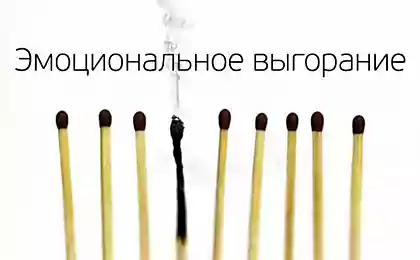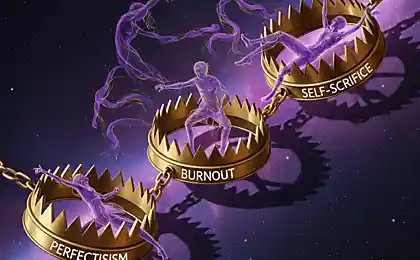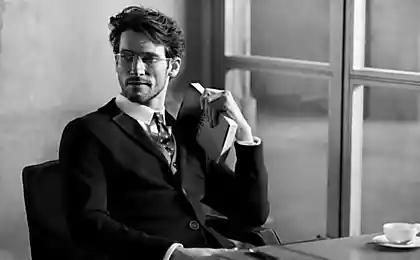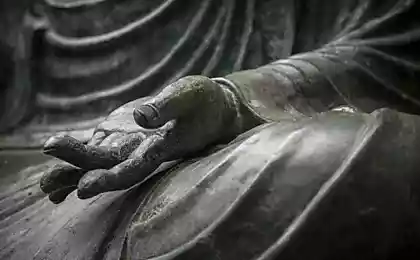535
Burnout ― a spiritual problem
Yes, it happens: it seems to be the lucky man with the job, she says its internal aspirations, allows you to implement the ability to leave a good mark in the world... And some time people on the job just burns, gives her everything he can. And then suddenly goes out.
And realize that anything they don't want it, nothing to do with work, he was not pleased. Charge, for a piece of bread, for the finally simple reason that it is too late to look for something else, the person continues to work at his recently favorite and abundantly logonasuser field. The field was not changed, but the farmer is not the same, and the fruits are not the same, and nerves, and discouragement leans. Professional burnout — is more recently called; suffer from it and teachers, doctors, journalists, musicians, and priests…
Fifty seven million six hundred eighteen thousand eight hundred ten
What happens with people and what to do with it — explain the priest and the psychologist Petr Kolomeitsev, Dean of the psychological faculty of the Orthodox Institute of St. John the theologian Russian Orthodox University. It is well known that a man can be tired. Fatigue there are many kinds: physical, intellectual and emotional. It is important to know that people get tired not just from physical work or from mental activity, but also emotionally from the emotional experience.
A person's ability to experience strong feelings is not unlimited: it has a limit. When people without end is at the limit or beyond the limit of its possibilities, he can come emotional burnout.
Different people have different emotional resources. One person may experience many emotions, and other emotional satiety occurs very quickly, and then there is the desire to dissociate itself from the affectively charged information to keep at least some forces. A phrase from the movie "gone with the wind": "I'll think about it tomorrow" — reflects precisely this situation.
Emotions can be devastating for the person and the psyche has its own protective defenses. For example, the displacement from the memory of man from those memories, which are associated with too many emotions.
When these mechanisms cannot cope, there is what is called emotional burnout. This often happens with people the helping professions — professions which require constant contact with other people and helping them.
There are two signs of emotional burnout. The first indifference is when a person does not want and he did not respond, he loses empathy, ceases to perceive the pain of others, even becoming cynical. The second sign of burnout is irritability, sometimes amounting to hysteria.
Sometimes it happens that people because of emotional fatigue could not bring to an end a phone conversation and just hang up: "I can't!". Now imagine a priest who needs the day to hear the confession of a hundred people. Hundreds of different people, each needing some attention and compassion. It's very hard! And how many suffering patients can sustain a doctor? How many of your customers can help a psychologist, maintaining empathy, that is compassion? And the teacher how many students he can maintain emotional contact? And the people of art, actors that do not simply depict, and live each role? Unfortunately, emotional breakdowns, many people often lead to quarrels with your families and friends, to scandals, to the heavily…
Many familiar with this condition — when you want nothing: neither see, nor hear, nor respond to anything, and want only to close my eyes and plug my ears. What had been found before in the heart of the lively response and gave rise to the desire to act now leaves the heart indifferent. The person feels that he has come for some "hardened insensitivity": torpor and desolation.
People suffering from inexplicable to him of apathy, blames himself in the lack of enthusiasm, unsuccessfully trying to shake things up. Gradually, he leans toward skepticism and cynicism, and his work acquires the features of a formalism.
When a person does not want to put up with approaching him with apathy, believing it is immoral, it is by willpower forcing himself to perform necessary actions — such behavior leads to extreme irritability, passing hysterical. So, for example, the sick and the elderly often cause the hospital medical staff does not participate, and irritation and anger. In the end the feeling of futility of their efforts leads to General depression.
Emotional burnout was not invented by anyone, it is reality of our life, inevitably overtakes the most caring people.
As a result of burnout people have dependencies. Alcohol, tobacco, sexual and Internet addiction is a misguided strategy of survival.
The main mistake people helping professions — a focus on the imminent and obvious result, for success, the desire to "cause a person good." The patient should go to the amendment, the client after the first conversation with the psychologist must depart from him on the wings, the slower student to Shine, and spiritual child — to clear up and rise again. And when that fails, it's emotional, depletes the person who invested in an attempt to help all his strength. The first thing he should pay attention to not to rely on immediate results. Know just be present in your life afflicted, just to pass some part of his journey with him — it is a lot. In fact, the result can only be known through the years, and it is necessary to treat this. Stopped to wait for an immediate result, we have a little protect yourself from burnout.
Unfortunately, the Soviet education has invested in many of us such anticipatory guilt: we should give the work all his strength, to burn it, and who thinks otherwise is irresponsible.
There is an anecdote. Exactly at 18.00, one of the office staff is collected and goes home. The next day the situation repeats itself, the third colleagues do not stand up and make the remark: "We all know that the end of the working day at six, but as you can see, sit and work until nine, and ten. Why do you have such a demonstrative principles?". What he says: "Yes, I understand, just I already the third day of my vacation...".
And in fact, we don't have to burn yourself out, we need to be able to her to protect themselves. Taking care of yourself is not selfishness, and Vice versa. If you fly a plane, do you remember the instruction: what you need to wear an oxygen mask when depressurization of the cabin? On the child? No, on yourself. Because if you put the mask on a child and then lose consciousness, the child on a mask you don't wear. And put the mask on yourself, you will save the child, even if he had already lost consciousness.
If we don't help ourselves, we will not be able to help others. If we are in hysterics, then how can we reassure the other person, to bring it to life? Exasperated, exhausted priest or psychologist can sometimes a person to "help" that the man go and hang himself. Chronically tired and sleep-deprived mother, as if she loved her child, maybe for nothing to come down on him with a terrible anger even hit. Therefore, to avoid burnout, it is necessary to monitor yourself and be aware of how balanced you are now, do you have any other resources not required if you vacation.
We have to work with pleasure. It is also not in our culture, too, and it sounds like something unusual for us. We've learned that we have to work through force, "plow", "to work hard". And ideally, people should work as much as can and as he wants. If he wants more than he can, it is wrong. And wrong if he does something "not through want." Ideal — when a person "can" and "want" are the same.
But we have this terrible word: "must"! And can always be a situation of force majeure, Abraham, a situation from which we just can't break, to allow yourself to rest. If we are responsible people, we will find the strength for an extra mobilization. But you need to know that these forces we would like to take your body in the duty of those forces that intended for the future. Something like a loan against future wages. Therefore, after the force majeure must be some kind of rest. We need to recover, maybe even treat yourself to something. Then we even force majeure will be a joy: did, could, able, now rest. But if force majeure was the norm — this is the shortest way to the asylum.
The priest has their ways of dealing with the threat of burnout; above all is a confession. Confessing, a priest is a priest-colleague to look at it from the side. Similarly, the therapist requires supervision. But the priest need is spiritual advice. Therefore, the diocesan clergy professed fathers not quite as laymen. They should see what he represents as a shepherd, he makes mistakes that he needs to correct in itself.
As for people of other helping professions — I would, of course, advise each of them to meet regularly with a psychologist, but it is not always feasible. In alarming cases, it is necessary to apply. But confession and Communion are simply necessary. Of course, third-party opinion of the priest and his good advice will certainly assist the man, but when man speaks directly to God and His supernatural help through the sacraments of the Church — then God works miracles! Because Jesus Christ is the true physician of souls and bodies our. He gives new strength and understanding of how to live.
In our Church come and University professors, and school teachers, and educators of children's homes, health workers, and artists, and psychologists. Their problems are generally not with a lack of piety, and with excessive stress and emotional fatigue. Looking at these our members, I just don't understand: what there are, how they live those of their colleagues who don't come to Church, don't join his spiritual powers, don't ask for God's help?
The problem of burnout is a problem not only psychological but also spiritual. Burnout is the result of sin. And in most cases — the sin of pride. Pride gives birth to the ego. A person takes on too much without thinking about the responsibility for the result of their labor. He is waiting for success, rewards, praise, and when it does not receive, is under threat of an emotional breakdown.
There is another spiritual problem, which also leads to fading: when a person tries to strengthen the work to deal with the guilt. Guilt of some sins, mistakes, discord present in his life. He feels that the work he will atone; that in punishing, executing this work, he will solve his spiritual problems and receive forgiveness.
This mistaken position, hidden behind pious reasoning does not lead us to God, and further alienates us from Him. Many are in this dangerous delusion, and it is dangerous because try to earn some of their business and the forgiveness of guilt of sin is stupid and arrogant. We never will be able to earn that forgiveness. And God gives us this gift of forgiveness through confession, and He gives it simply because he did not want the death of the sinner: For it is by grace you have been saved, through faith-and this not from yourselves, it is the gift of God: not of works, lest any man should boast (Eph. 2, 8-9).
As for our activities — it must be the fullness. The fullness of grace, which we receive abundantly from the Lord and which, pouring over the edge, helps others.
What person is not facing burnout? Humble. Though, because a humble person recognizes the limitations of his forces and will not be fixated on the immediate and high. It has no unhealthy perfectionism. He knows that God has given him some opportunities: as long as God let go to do it and do it, and to squeeze out the last juice will not. Humility will help him to stay if he's going to take more than. Real humility is not self-deprecation, which the Holy fathers would say that it is worse than pride.
Burnout is also a problem of lack of faith. Believer or aloverose not seen the Providence of God; he "must make himself", it is very important for the result. Believer or imagine God is infinitely far forced to do everything himself, to rely only on themselves, to believe in themselves. And then, of course, easy to overstrain. But when a person waits on the Lord, he knows All can things through Christ (Phil. 4, 13). The Lord arranges everything in our life so wisely that there is no ineffectiveness. Our failure, the failure can be meet with God. If we did not get the result we wanted, there is always a different result, is spiritual, and it may be much more important and necessary to us now than another "labour achievement". published
Priest Pyotr Kolomeitsev P. S. And remember, just changing your mind — together we change the world! ©
Source: www.pravmir.ru/vyigoranie-problema-duhovnaya/
And realize that anything they don't want it, nothing to do with work, he was not pleased. Charge, for a piece of bread, for the finally simple reason that it is too late to look for something else, the person continues to work at his recently favorite and abundantly logonasuser field. The field was not changed, but the farmer is not the same, and the fruits are not the same, and nerves, and discouragement leans. Professional burnout — is more recently called; suffer from it and teachers, doctors, journalists, musicians, and priests…
Fifty seven million six hundred eighteen thousand eight hundred ten
What happens with people and what to do with it — explain the priest and the psychologist Petr Kolomeitsev, Dean of the psychological faculty of the Orthodox Institute of St. John the theologian Russian Orthodox University. It is well known that a man can be tired. Fatigue there are many kinds: physical, intellectual and emotional. It is important to know that people get tired not just from physical work or from mental activity, but also emotionally from the emotional experience.
A person's ability to experience strong feelings is not unlimited: it has a limit. When people without end is at the limit or beyond the limit of its possibilities, he can come emotional burnout.
Different people have different emotional resources. One person may experience many emotions, and other emotional satiety occurs very quickly, and then there is the desire to dissociate itself from the affectively charged information to keep at least some forces. A phrase from the movie "gone with the wind": "I'll think about it tomorrow" — reflects precisely this situation.
Emotions can be devastating for the person and the psyche has its own protective defenses. For example, the displacement from the memory of man from those memories, which are associated with too many emotions.
When these mechanisms cannot cope, there is what is called emotional burnout. This often happens with people the helping professions — professions which require constant contact with other people and helping them.
There are two signs of emotional burnout. The first indifference is when a person does not want and he did not respond, he loses empathy, ceases to perceive the pain of others, even becoming cynical. The second sign of burnout is irritability, sometimes amounting to hysteria.
Sometimes it happens that people because of emotional fatigue could not bring to an end a phone conversation and just hang up: "I can't!". Now imagine a priest who needs the day to hear the confession of a hundred people. Hundreds of different people, each needing some attention and compassion. It's very hard! And how many suffering patients can sustain a doctor? How many of your customers can help a psychologist, maintaining empathy, that is compassion? And the teacher how many students he can maintain emotional contact? And the people of art, actors that do not simply depict, and live each role? Unfortunately, emotional breakdowns, many people often lead to quarrels with your families and friends, to scandals, to the heavily…
Many familiar with this condition — when you want nothing: neither see, nor hear, nor respond to anything, and want only to close my eyes and plug my ears. What had been found before in the heart of the lively response and gave rise to the desire to act now leaves the heart indifferent. The person feels that he has come for some "hardened insensitivity": torpor and desolation.
People suffering from inexplicable to him of apathy, blames himself in the lack of enthusiasm, unsuccessfully trying to shake things up. Gradually, he leans toward skepticism and cynicism, and his work acquires the features of a formalism.
When a person does not want to put up with approaching him with apathy, believing it is immoral, it is by willpower forcing himself to perform necessary actions — such behavior leads to extreme irritability, passing hysterical. So, for example, the sick and the elderly often cause the hospital medical staff does not participate, and irritation and anger. In the end the feeling of futility of their efforts leads to General depression.
Emotional burnout was not invented by anyone, it is reality of our life, inevitably overtakes the most caring people.
As a result of burnout people have dependencies. Alcohol, tobacco, sexual and Internet addiction is a misguided strategy of survival.
The main mistake people helping professions — a focus on the imminent and obvious result, for success, the desire to "cause a person good." The patient should go to the amendment, the client after the first conversation with the psychologist must depart from him on the wings, the slower student to Shine, and spiritual child — to clear up and rise again. And when that fails, it's emotional, depletes the person who invested in an attempt to help all his strength. The first thing he should pay attention to not to rely on immediate results. Know just be present in your life afflicted, just to pass some part of his journey with him — it is a lot. In fact, the result can only be known through the years, and it is necessary to treat this. Stopped to wait for an immediate result, we have a little protect yourself from burnout.
Unfortunately, the Soviet education has invested in many of us such anticipatory guilt: we should give the work all his strength, to burn it, and who thinks otherwise is irresponsible.
There is an anecdote. Exactly at 18.00, one of the office staff is collected and goes home. The next day the situation repeats itself, the third colleagues do not stand up and make the remark: "We all know that the end of the working day at six, but as you can see, sit and work until nine, and ten. Why do you have such a demonstrative principles?". What he says: "Yes, I understand, just I already the third day of my vacation...".
And in fact, we don't have to burn yourself out, we need to be able to her to protect themselves. Taking care of yourself is not selfishness, and Vice versa. If you fly a plane, do you remember the instruction: what you need to wear an oxygen mask when depressurization of the cabin? On the child? No, on yourself. Because if you put the mask on a child and then lose consciousness, the child on a mask you don't wear. And put the mask on yourself, you will save the child, even if he had already lost consciousness.
If we don't help ourselves, we will not be able to help others. If we are in hysterics, then how can we reassure the other person, to bring it to life? Exasperated, exhausted priest or psychologist can sometimes a person to "help" that the man go and hang himself. Chronically tired and sleep-deprived mother, as if she loved her child, maybe for nothing to come down on him with a terrible anger even hit. Therefore, to avoid burnout, it is necessary to monitor yourself and be aware of how balanced you are now, do you have any other resources not required if you vacation.
We have to work with pleasure. It is also not in our culture, too, and it sounds like something unusual for us. We've learned that we have to work through force, "plow", "to work hard". And ideally, people should work as much as can and as he wants. If he wants more than he can, it is wrong. And wrong if he does something "not through want." Ideal — when a person "can" and "want" are the same.
But we have this terrible word: "must"! And can always be a situation of force majeure, Abraham, a situation from which we just can't break, to allow yourself to rest. If we are responsible people, we will find the strength for an extra mobilization. But you need to know that these forces we would like to take your body in the duty of those forces that intended for the future. Something like a loan against future wages. Therefore, after the force majeure must be some kind of rest. We need to recover, maybe even treat yourself to something. Then we even force majeure will be a joy: did, could, able, now rest. But if force majeure was the norm — this is the shortest way to the asylum.
The priest has their ways of dealing with the threat of burnout; above all is a confession. Confessing, a priest is a priest-colleague to look at it from the side. Similarly, the therapist requires supervision. But the priest need is spiritual advice. Therefore, the diocesan clergy professed fathers not quite as laymen. They should see what he represents as a shepherd, he makes mistakes that he needs to correct in itself.
As for people of other helping professions — I would, of course, advise each of them to meet regularly with a psychologist, but it is not always feasible. In alarming cases, it is necessary to apply. But confession and Communion are simply necessary. Of course, third-party opinion of the priest and his good advice will certainly assist the man, but when man speaks directly to God and His supernatural help through the sacraments of the Church — then God works miracles! Because Jesus Christ is the true physician of souls and bodies our. He gives new strength and understanding of how to live.
In our Church come and University professors, and school teachers, and educators of children's homes, health workers, and artists, and psychologists. Their problems are generally not with a lack of piety, and with excessive stress and emotional fatigue. Looking at these our members, I just don't understand: what there are, how they live those of their colleagues who don't come to Church, don't join his spiritual powers, don't ask for God's help?
The problem of burnout is a problem not only psychological but also spiritual. Burnout is the result of sin. And in most cases — the sin of pride. Pride gives birth to the ego. A person takes on too much without thinking about the responsibility for the result of their labor. He is waiting for success, rewards, praise, and when it does not receive, is under threat of an emotional breakdown.
There is another spiritual problem, which also leads to fading: when a person tries to strengthen the work to deal with the guilt. Guilt of some sins, mistakes, discord present in his life. He feels that the work he will atone; that in punishing, executing this work, he will solve his spiritual problems and receive forgiveness.
This mistaken position, hidden behind pious reasoning does not lead us to God, and further alienates us from Him. Many are in this dangerous delusion, and it is dangerous because try to earn some of their business and the forgiveness of guilt of sin is stupid and arrogant. We never will be able to earn that forgiveness. And God gives us this gift of forgiveness through confession, and He gives it simply because he did not want the death of the sinner: For it is by grace you have been saved, through faith-and this not from yourselves, it is the gift of God: not of works, lest any man should boast (Eph. 2, 8-9).
As for our activities — it must be the fullness. The fullness of grace, which we receive abundantly from the Lord and which, pouring over the edge, helps others.
What person is not facing burnout? Humble. Though, because a humble person recognizes the limitations of his forces and will not be fixated on the immediate and high. It has no unhealthy perfectionism. He knows that God has given him some opportunities: as long as God let go to do it and do it, and to squeeze out the last juice will not. Humility will help him to stay if he's going to take more than. Real humility is not self-deprecation, which the Holy fathers would say that it is worse than pride.
Burnout is also a problem of lack of faith. Believer or aloverose not seen the Providence of God; he "must make himself", it is very important for the result. Believer or imagine God is infinitely far forced to do everything himself, to rely only on themselves, to believe in themselves. And then, of course, easy to overstrain. But when a person waits on the Lord, he knows All can things through Christ (Phil. 4, 13). The Lord arranges everything in our life so wisely that there is no ineffectiveness. Our failure, the failure can be meet with God. If we did not get the result we wanted, there is always a different result, is spiritual, and it may be much more important and necessary to us now than another "labour achievement". published
Priest Pyotr Kolomeitsev P. S. And remember, just changing your mind — together we change the world! ©
Source: www.pravmir.ru/vyigoranie-problema-duhovnaya/























